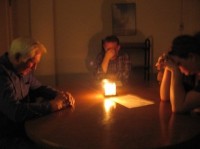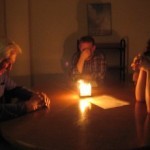 In a previous post, I suggested that you do not go to church; the church goes with you. Or to put it another way, wherever you go; there goes the church.
In a previous post, I suggested that you do not go to church; the church goes with you. Or to put it another way, wherever you go; there goes the church.
This raises questions about Matthew 18:19-20, which says that wherever two or three are gathered together in the name of Jesus, He is there with them in their midst. This verse is often used in one of three ways.
Matthew 18:19-20 – Three Uses
First, it is used to condemn lone ranger Christians. You know, the ones who have church by themselves on the ski hill, in the bass boat, or (most likely of all), asleep in bed. To these sorts of Christians, people quote this verse and then say, “You can’t have church by yourself.” Of course, they frequently go on to say that you can’t just be with one another believer, there also needs to be a preacher, and some singing, and prayer, and an offering, and communion, and… well, you get the picture.
The second way this verse is used is to make pastors feel better when attendance is low at a Sunday service or prayer meeting. I remember one Sunday service in my first church when only five people showed up, counting my wife and myself. I distinctly remember quoting this verse to the congregation to help us realize that even though nobody else came, Jesus was there with us. It didn’t make me feel any better…
The third way this verse is often used is to defend house churches. Traditional, brick-and-mortar church people say something like, “You can’t really use your gifts in a small fellowship. You have to be part of a big fellowship where all the gifts are present and everybody is helping each other.” It is highly unlikely that everybody is using their gift in a big church either, but regardless, the house church proponent will often quote Matthew 18:19-20, defending the view that although only a few people gather, house churches are churches too.
Personally, I don’t think any of these uses are proper.
Matthew 18:19-20 in Context
Matthew 18:19-20 is one of those verses (like every other verse in the Bible) where context is key. In the immediately preceding passage, Jesus is providing instructions on how to restore a fellow believer who is sinning. It is after these instructions that Jesus talks about two or three gathering in His name.
So what Jesus is saying is that when the church is trying to restore a sinning brother or sister, He is there with them, helping them make wise and loving decisions for the good of the sinning person and the entire church. The verse has nothing to do with determining what is church and what is not, and everything to do with how the church can help one of its straying members.
Matthew 18:19-20 in Theology
Even without the context to guide us, however, a little theological reflection reveals that Matthew 18:19-20 cannot be used to define a church meeting. If Jesus is saying that He is only present when two or three are gathered, then does this mean that Jesus is not present with each one of us as we go about our day? Is He not with you when you pray, and when you go to work, and when you face trials and temptations? Is Jesus not with the Chinese pastor in a solitary confinement prison cell? Is He not with the single mother as she struggles to raise her children by herself?
To ask such questions is to answer them. The rest of Scripture makes clear that we are in Christ and He is in us, and He will never leave us nor forsake us, and no matter where we go or what we do, He is right there also.
So can a solitary believer be the church after all? We’ll address that question later this week, but for now, what do you think?


That’s really interesting. I’d never read that passage with the previous verses in mind. What then do you make of the “binding and loosing” verses in between the church disciplines verses and the “where two or three are gathered” verse? Are they also in reference to correcting wayward brothers?
Chris,
Yes. I don’t have access to my notes right now, but I seem to remember something about “binding and loosing” being a legal phrase for court proceedings, and so Jesus is saying that Jesus will help us reach proper “verdicts” as we seek to restore one another.
By the way, I REALLY liked your blog post yesterday, and am going to post an excerpt later today. Thank you for writing it.
Isn’t it interesting that there is often another understanding/interpretation of passages that we’ve been told THE meaning of for a very long time? Perhaps the heresy hunters are the real heretics! (“Perhaps” is probably too kind.)
Thanks for posting on Saturday. The few Christian blogs I follow usually don’t have much activity on the weekends. Maybe everyone’s getting ready for and going “to church”. In reality, they’re probably posting M-F when they’re in the office, quite often the church office.
Thanks for reading on Saturday! The weekends are usually blogging black holes, and so I usually try to fill the void with something for those who stick around.
Jeremy,
As to the “binding and loosing” passage… there is an interesting grammatical construct in that verse that is usually lost in our English translations. If I were to translate it extremely literally, it would be something like this:
“Whatever you bind on earth will have already been bound in heaven, and whatever you loose on earth will have already been loosed in heaven.”
It seems that Jesus is telling us that decisions that we make as a community with him among us is a decision that has already been made in heaven (i.e., by God).
-Alan
Alan,
That’s it! I knew I remember reading something about it somewhere. It was the grammatical construction there. So does this mean that the decision was already made by God, and he helps us arrive at the same decision?
That’s explained in 1 Corinthians 2:16, For who hath known the mind of the Lord, that he may instruct him? But we have the mind of Christ.
Alan
Great way of translating the perfect passive participles! That really does help to explain/understanding what the text is saying.
Bringing out the Greek! Awesome.
I note with critical observation your explanation of Matt.18: 20, to the effect that there is more explanation owed to this verse than you have done. Remember Jesus mentioned the hatred of the world towards believers and persecution as factors that would destabilize their conventional assembling for worship, Matt. 10: 22-23. Secondly, the present depraved doctrinal/spiritual condition of Christianity warrants heeding the call of scripture to individual believers to come out of it in order to preserve their purity, 2Cor. 6: 17, Rev. 3:20, Rev. 18: 4. This is reminiscent to Elijah’s spiritual era in Israel, 1Sam. 19:18. When a remnant of 7000 people in a whole literal nation defied conventional temple attendance to evade the worship of Baal, back then, just as Elijah had done, why can’t it happen in a spiritual nation, the church.
I need not lengthen this comment by lecturing you about the attributes of the falling away of the church where denominationalism features most prominently. Whether we like it or not, the judgment of God will not spare those who advocate the division of the body of Christ, portrayed in denominationalism.
Enjoyed the article and the comments very much.
Thank you! It was good… reading this article, but this was not the scripture I was searching for while using Google.
God’s people are the “church,” not a fancy multi-million dollar casino with bowling alley and juice bar like the mega churches every worldly pastor dreams of and many have attained. We ought not be uppity nor put God in a box that man has created. He uses the Homechurch as well as the big building full of sheep. He is much, much bigger than your anxiety over, “where 2 or more are gathered in His name vs 100’s-1000’s under 1 very large roof. Remember the Sermon on the mount… give God due credit as to being the One in charge. He is, the Almighty, afterall.
Not trying to be facetious here but looking at the origin of the word translated “church” “ecclesia” the meaning was always an assembly, so you cannot possibly have an assembly of one. Yes you can commune with God on your own, pray, worship and do most everything one does in church, but no, you cannot be the church on your own, because you are not an assembly.
JC
If the spirit of Jesus dwells in us don’t we become Two. Which helps make since when explaining how 1+1=3. 1 spirit filled Man make’s 2, 1 spirit filled woman make’s 2. When a couple gets married there is 1 Man, 1 Woman and 1 Spirit, because the same Spirit that dwells in them when they were single, now dwells as 1 as they are a couple. Right?
The Best commentary on the above passage – Jesus being present in matters of Church discipline is seen in 1 Cor 5.
1. It begins with putting out a man from fellowship who has sinned
2. v3. I am not with you physically but in spirit and have already passed judgement (bound him)
3. v4. Jesus is also present as he promised when you assemble in his name
4. v12 and 13 Judge those among you who are constantly and blatantly sinning and get them out of Church
A question on Matthew 18:19 — what if two people agree on a false judicial claim and request a false punishment? Would God agree with them (verse seems to imply yes, but obviously no)? How do you make sense of